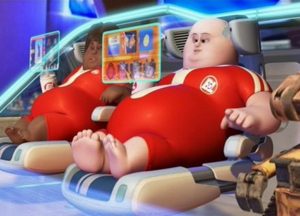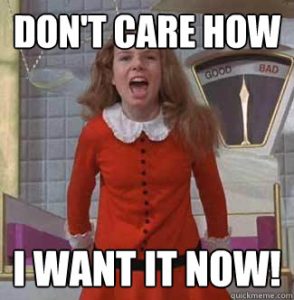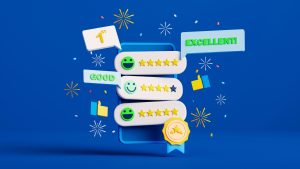Remember Wall-E?
Pixar’s little trash compactor spent his days cleaning up trash on now inhabitable planet Earth, liked Hello, Dolly! the movie and fell in love with an alien robot.
The heartwarming story of life, love, and humanity (ironically learned from a machine) teaches us many lessons. Believe it or not, one of them is that of what happens when big businesses focus on profits instead of creating a good customer experience.
In the story, that takes place 700 years into the future, people were stuck living in a big spaceship, staring at screens, and eating large quantities of unhealthy food.
Living as full-time consumers, immobilized by their own obesity and inactivity, people of the future seemed complacent, but their quality of living leaves a lot to be desired.
Who is to blame for all this? Well, the Buy-N-Large Corporation, of course. A big company responsible for destroying Earth’s environment, it fails to clean it up in the time promised and tricks people into indefinitely floating in space as mindless consumers. Pure evil.

Fictional futuristic parody aside, our world is changing quickly. As it does, customer expectations of customer experience and the way companies provide it change as well.
Related Post: What Will the Future Be Like?
Necessity is the mother of invention.
The customer of the future will have different needs, ambitions, and desires. With that in mind, companies of the future will have to adjust to the new values and reinvent the customer experience in a way that appeases to the new ideals.
So what can businesses do to ensure they do not become Buy-N-Large Corporations that destroy the world? How can they provide excellent customer experience that will satisfy the customer of the future in a responsible manner and not turn them into space-floating mindless blobs?

Fasten your seat belts because we’re taking you for a trip into the future. The one where businesses flourish and healthy customer experiences make the customers of the future very happy (and all here on Earth, too.)
Who is the Customer of the Future?
We obviously can’t see the future. Though we always try.
(Just check out this prediction of the future world from the 1920s)
As we look at the customer of the future projections, all we have to go on is the continuation of the current trends.
That is precisely what Lippincott, a media and design company, did when it created the customer of the future profile.
The interactive web page takes the visitor on a little meet-and-greet with a future customer named Dawn. It’s a trip worth taking, even just for the fun of it, so do have at it:
Customer of the Future by Lippincott.
So who will Dawn, the customer of the future, be?
She’ll be independent, flexible, and creative. She’ll be connected – technology and innovation will be at the backbone of her existence. She will be ambitious. She’ll care about her health and the environment of the planet. She will cherish her relationships with fellow humans, but machines, computers, and robots will have a strong presence in her world.
Technology will continue to play a major role in both shaping the customer of the future and addressing her needs. Not only that, technology will be so deeply embedded in her life, the integration will become even more seamless.
9 ways technology will affect the future of customer service. #CX #CRM https://t.co/Da5QBIksXQ
— LiveXchange Corp. (@LiveXchangeInc) August 5, 2019
As we move into the future, continuous innovation will change many aspects of our world – the way we travel, the way we connect, create, work, rest, socialize; the way we live.
Blake Morgan, a customer experience futurist and author of The Customer of the Future talks about what a morning routine will be like in 20 years from now:
Lippincott projects that the current technological trends will continue and innovation and technology will further shape customer experiences:
We’ll know more (from artificial intelligence, genomics, and smart devices) and we’ll share more (from stories on Instagram to homes on Airbnb). We will automate more, monitor more and customize more. We’ll get faster, more flexible and more connected (at least digitally). (Lippincott, Customer of the Future)
As technology continues to shape our world, some things are bound to remain constant. While our cultural values might shift, our embedded human truths will stay the same. These truths are so fundamentally human, they have been at the heart of human existence since the dawn of time and they are not going anywhere.
And, yes, Dawn, the customer of the future, will still seek these truths: connection, belonging, love, control, achievement, security, validation, creativity, efficiency, freedom, pleasure, and self-actualization.
Keeping these irreplaceable human values in mind will be essential as companies strive to provide excellent customer experience and engage successful business practices in the future. Focusing on customer experiences is the only thing that will ensure successful business.
(Unless they want to end up like the Buy-N-Large Corporation, that is)
What Does the Customer of The Future Want?
In a few words, the customer of the future will have some distinct desires: she’ll want to share her life with the world, she’ll prioritize experiences over things, she’ll move around and travel a lot, she’ll always be connected, she’ll trade privacy for convenience, and she’ll trust transparency in every aspect of life.
Generally, we can identify five characteristics of customer experience that will matter to the customer of the future.
1. Human Connection
If you ever had to connect to a customer service representative via phone or live chat, you’ve probably experienced the frustration of not getting to a live agent.
via GIPHY
Currently, 75% of customers believe it takes too long to reach a live agent when seeking customer support (Harris Interactive)
As machines, computers, robots, and automated everything continues to assist humans in their daily activities, human connection remains an essential desire. We are wired to seek connection and belonging and no technological advances will change that.
A7 @AlHopper_ you can never replace the human element. U can tell by people’s animosity towards robots #custserv pic.twitter.com/fz3CxzTKoK
— Rob Christianson (@robchristianson) March 23, 2016
No robot or machine can ever replace human kindness, empathy, and basic humanity. Humans will always want to connect with other humans.
So as the customer of the future goes through her day and engages in her daily activities, she will still want to interact with other humans, either face-to-face or virtually. So while in the future the efficiency and speed of connecting to a real human might improve, but the necessity of human element will remain.
In Wall-E the Buy-N-Large placed a fleet of machines, computers, and robots in charge and the result of complete human disconnect proved to be disastrous. Once a human took control, however, better things occurred. (No spoilers, but have you watched or rewatched the movie yet, by the way? If not, do so as soon as you are done reading this article! Seriously!)
Future Action:
Companies of the future will have to keep humanity and human connection in all of their operations and train their future employees to do the following:
- Rely on humans as main workforce. While mundane, simple, mechanical tasks can be delegated to machines, humans should always be available to connect with customers
- Train employees in empathy, kindness, and understanding – essential qualities of effective connection. Learn what makes customers happy and what triggers them. Know your customer!
- Employ unique elements of customer experience only achievable by human creativity. Humans are limitlessly creative, which is a quality robots will never have. Adding creativity to customer experience does wonders to customer satisfaction and loyalty.
- Tell stories. The art of storytelling is a powerful tool that can create connection, promote brands, and keep the word about a business going, all while supporting the main goal of delivering superior customer experience to the customer of the future.
2. Freedom and Flexibility
“Don’t care how, I want it now!”
Customers of the future will want freedom, flexibility, and everything available on demand.
We can already see this trend as customers place grocery orders online, brick-and-mortar stores have to reinvent themselves, and everything we ever want is always at our fingertips. There are three things she finds intolerable: Waiting, Boredom and Unnecessary Effort.
1) Waiting. She can’t stand buffering, so she’s certainly going to cut ties with any company or any experience that makes her wait.
2) Boredom. With the entirety of the universe’s entertainment collection available in an instant, her expectations for stimulation are astronomical.
3) Unnecessary Effort. She’s a hard worker, so she’s fine with effort — but it’s the unnecessary kind (like repeating information or going back and forth) that she absolutely cannot stand.Her thresholds for these nonstarters are getting lower by the minute.
(Lippincott, Customer of the Future)
This is where technology plays the largest role.
Virtual reality, artificial intelligence, geolocation services, and Internet-of-Things (a network of interconnected devices), technology will assist humans in the instantly gratifying world of everything on-demand.
Freedom of endless choices will dominate our customer experiences. While a variety of products and services will play an important role, the convenience with which these amenities will be available will play a bigger part in customer satisfaction.
While our friends from Buy-N-Large give the consumers of that future world consumption choices, they do not keep the customers and their needs in mind. Buy-N-Large was profit-focused instead of customer focus and that is how the future world ended up destroyed, obese, and mindless. Not good for anyone.
Future Action:
For a long time, businesses set the rules for customer experience. Customers followed these rules and all went well in the world. Closed on Sunday? Ok. Only have this dress in blue? Ok.
Well, the customer of the future is not buying that. In the future companies will have to become so customer-focused, everything they do will have to revolve around the clients and their wishes.
Some must-dos to progress into the future effectively:
- Do business on customer terms. Find out what customers want. Journey mapping, a process of finding out exactly how your customer feels, what he does, and what touchpoints he has with the company is a great way to learn everything you need to know about the customer. And they give her what she wants.
- Make the process of doing business with your company easy. Make sure your website is easy to navigate. One of the cornerstones of a successful business is an effortless experience.
- Allow self-service. Yes, we’re aware that we just advocated humans as the main workforce of your business. We stand by that statement. However, the customer of the future is a bit of a fussy girl. She wants choices. And sometimes she might want to do things herself. So let her.
Related Post: Automated LiveChat Services Are Going to Take Our Jobs? Or Aren’t They?
- Include elements of customer experience that engage the customer and all of her senses. An engaged customer is a happy customer. Visual experiences, virtual reality, smart technology, along with new upcoming technology and innovation are the way of the future.
- Listen to your customers. Remember, one of the basic human truths is validation. Customers want to be heard. Collecting feedback, listening to the customer’s concerns, and engaging with clients will satisfy both the validation and the connection need shared by all humans.
- Be flexible. One of the most important qualities of progressive business is adaptability. How well can a business adapt to change? With continuous technological and cultural innovations the world is moving at a faster pace than ever. The ability to embrace change and move with the times to serve the ever-moving customer of the future is crucial to success.
3. Health and Environment
The topic of environmental protection and environmental responsibility is the one that always comes up when discussing the future of our world.
Human activity has caused damage to Earth’s environment and while the account of the impact varies and continues to be the subject of many discussions, one thing is clear – any successful future plan for business and life has to include a plan for environmental responsibility.
The customer of the future cares about the environment and will trust companies that care.
Wall-E’s world was destroyed by the endless consumption with no environmental responsibility and that is not the world anyone, Buy-N-Large’s CEOs included, wanted to live in.
The chubby inhabitants of the spaceship on which Wall-E eventually finds himself are also victims of mindless unhealthy consumption.
The health of the human population – physical as well as emotional – is an important factor to consider as it is an enormous factor in overall happiness.
Related Post: Cure for the Mondays – How to Improve Emotional Wellbeing and Feel Joy
Though huge amounts of unhealthy, processed foods, lacking nutrition have been available throughout the 20th and 21st centuries, there has been a trend towards better choices. People are more health-conscious these days and the trend is only to continue.
A great example of responsible farming and nutritional care is set by companies like Anson Mills. The founder of the company, Glenn Roberts, dedicated his career to bringing back the heirloom varieties of grains. These foods, once a staple of American cuisine, nearly vanished from the consumers’ tables as the cheaper, more profitable but nutritionally insufficient varieties of crops such as rice, corn, buckwheat, and other grains took over the market in the 1950s and beyond.
Anson Mills gives seed to farmers who will take care of it, perpetuating responsible grain harvesting. #natlsum11
— Kristi Willis (@kristiwillis) October 24, 2011
Agriculturalists like Roberts and restaurateurs like Sean Brock, a renowned southern chef who partnered with Arson Mills, support the return of more nutritionally rich and responsibly grown crops. They are the pioneers in the field of sustainable, environmentally responsible and health-conscious farming that will satisfy the customer of the future’s craving for health and wellness.
The story of Anson Mills and the revival of pre-commercial crops is also that of care. Companies that care, genuinely care, are the ones that will prosper in the world of the customer of the future.
Future Action:
The act of being an environmentally responsible company hots two birds with one stone. (No, no actual bird-killing, we’re talking about saving the environment!) It appeals to the environmentally and health-conscious customer of the future and it saves the planet, a place that all of us call home. It’s a win-win.
- Show you care. If a company genuinely cares about the customer will notice. Businesses that rank high in customer satisfaction show care for their customers, their employees, and the world in which they operate. Do good and be good.
- Invest in responsible practices. As many futuristic projections show, irresponsible business leans to global environmental disaster. Depleted resources mean business hardship. Understanding the importance of environmental consciousness is essential for the future of humanity.
Bottom Line:
The customer of the future will have a variety of demands. We might not know what all of them will be and what new technology, ideas, and cultural shifts will arrive to influence them. We can, however, make certain predictions based on current ongoing trends and our past experience.
The future consumer will base her desires and preferences on universal human truths we’ve all shared since the beginning of time. As companies, we must keep these truths in mind as we embrace change and move into the future as prosperous entities that care about the customer.
Entities that do not in any way resemble Buy-N-Large.
Now please go watch Wall-E. It’s a classic.





